
NETWORK SLICING AND IA WILL BE KEY TO 5G NETWORK DEVELOPMENT AND THE FUTURE OF 6G
- “Slicing is one of the great benefits of 5G that allows flexibility in both the use and allocation of network resources,” said Angélica Sánchez, director of Business and Marketing at Orange Spain.
- Juan Cambeiro, head of 5G projects with the customer at Telefónica, said that “Artificial Intelligence is an unstoppable trend” that will revolutionize the 5G and the future 6G.
- César Antón, Network as a Platform Design and Development Manager at Vodafone Business, highlighted the importance of “joint work and collaboration between the different actors” for the standardization of API networks.
- The main operators in Spain were the protagonists of the first virtual day of the 5G Forum 24, held yesterday, which will continue until May 10 via streaming.
The flexibility of network resources, security, AI and sustainability are some of the pillars on which 5G networks are built and on which 6G will be based, a network on which work is already underway and which was a common theme, especially among representatives of MASORANGE, Telefónica and Vodafone, on the third day of the 5G Forum 24, “Where 5G leaders meet”, held yesterday.
After the success of its two face-to-face sessions with record attendance figures at the Nissan Cartuja Auditorium, located in the PCT Cartuja in Seville, where more than 500 top-level professionals gathered, the virtual sessions of the 5G Forum have taken the baton until Friday, May 10.
Slicing, the main focus for MASORANGE
The three main operators in Spain, MASORANGE, Telefónica and Vodafone, took center stage yesterday, which started the multinational MASORANGE, an entity resulting in the form of a joint venture controlled 50% by the French Orange and Lorca JVCo, British parent company of MásMóvil. Angélica Sánchez, Director of Business and Marketing at Orange Spain, presented the latest news and advances on new uses, sustainability and security in 5G of this company that has become the “first operator in number of customers in the Spanish market”. With 4G coverage that already covers 99% of the population, MASORANGE is working to continue increasing the “deployment of 5G, which already reaches 84% of the total population”.
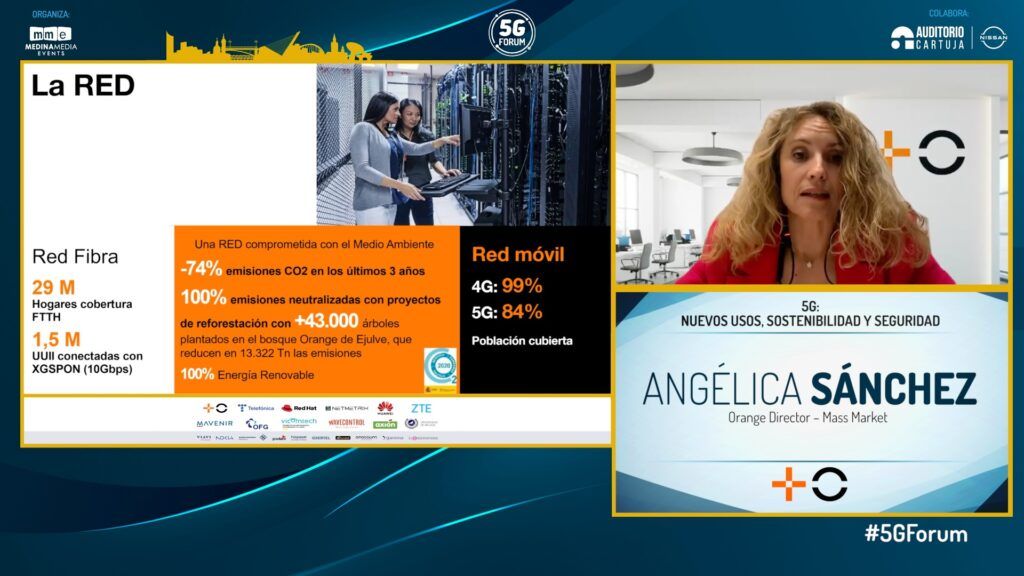
“5G is becoming the network of the future and all services must be carried by this network,” said Angélica Sánchez, who listed four basic axes in the development of 5G: network slicing, FWA, security and sustainability. “Slicing is one of the great benefits of 5G to be taken into account due to the demand for very low latency,” said the marketing director at Orange, because “it allows flexibility in both the use and allocation of network resources”. In addition to this network architecture, Fixed Wireless Access (FWA) will provide an experience very similar to that of the fiber customer, but over the mobile 5G network. The security and sustainability aspects of 5G are no less relevant, “to create a more secure network that consumes 13 times less than its predecessor”.
Artificial Intelligence, an unstoppable trend for Telefónica
The Spanish multinational Telefónica celebrated its 100th anniversary in this seventh edition of the 5G Forum, with the presence of Juan Cambeiro, head of 5G projects with the customer at Telefónica, who addressed future trends around 5G, a technology on which he considers that “there is still a long way to go”, but on which Telefónica is working with great ambition. Under the slogan “learn from the past to anticipate the future”, precisely predicting the future and the performance of the network will be possible thanks to Artificial Intelligence, “unstoppable trend” for Cambeiro, who argued the importance of “anticipating the conditions and circumstances so that the customer does not suffer connectivity problems”.
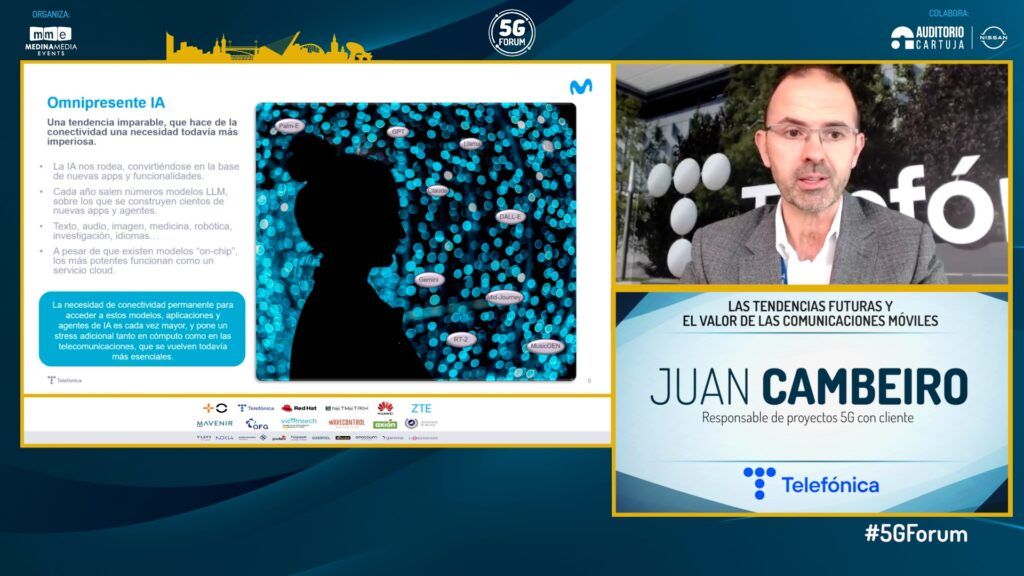
Juan Cambeiro listed sustainability, quantum, augmented reality (XR+IA), space communications, demographic evolution and environmental awareness as future trends, although he emphasized Artificial Intelligence as the common denominator of all of them because “its use is multiple” from the “monitoring and support offered to the client” to the “need to upload video to the cloud” or the “detection and solution of complex problems”.
Standardization of API networks, by Vodafone
On behalf of the British multinational Vodafone, César Antón, Network as a Platform Design and Development Manager at Vodafone Business, addressed yesterday the standardization of API (Application Programming Interfaces) networks, highlighting the importance of “joint work and collaboration between the different actors”. For Antón, “many changes of this use will make sense if they reach more than 70% of customers”, otherwise, all efforts will be in vain. In this context, operators will play a key role, as the commitment of many of them and working together will be necessary: “If we are thinking of democratizing this use, we have to provide solutions that are simple,” said César Antón, who pointed out that “in 2028 the total global volume of business in this area will be 22 billion dollars”.
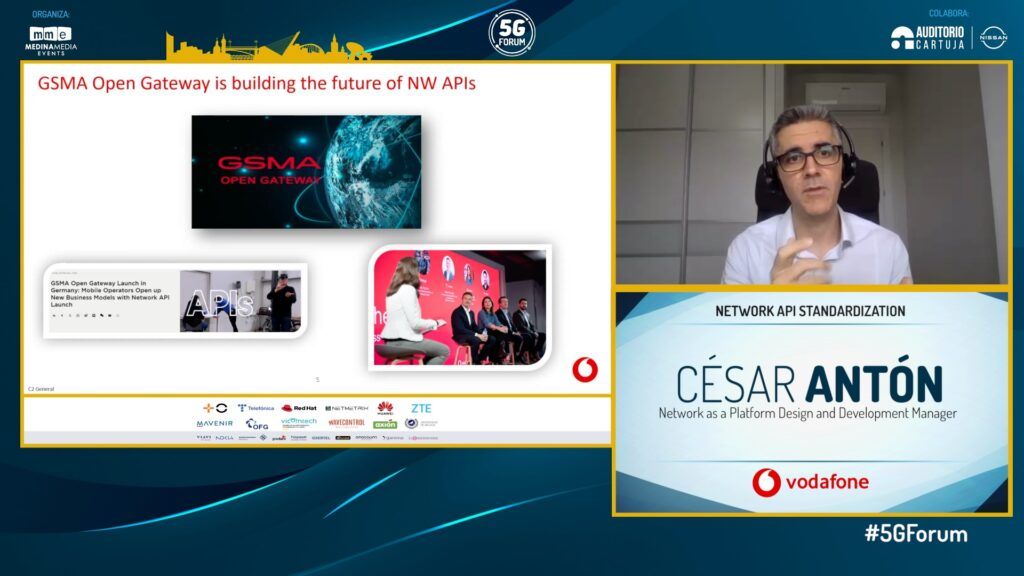
“5G is a more secure network because it carries the fight for security natively.”
José Joaquín Escudero, head of Advanced Mobile Communications at Gradiant, previewed one of the main themes of the 5G Forum 24, cybersecurity, which will have an exclusive day dedicated to it on Friday, May 10. “Security should be addressed as a whole for the mobile network, i.e., it is not enough to guarantee with a high probability of success the security of certain network components if there are other components that are very vulnerable,” said Escudero, for whom “5G is a more secure network because it carries this fight for security natively.
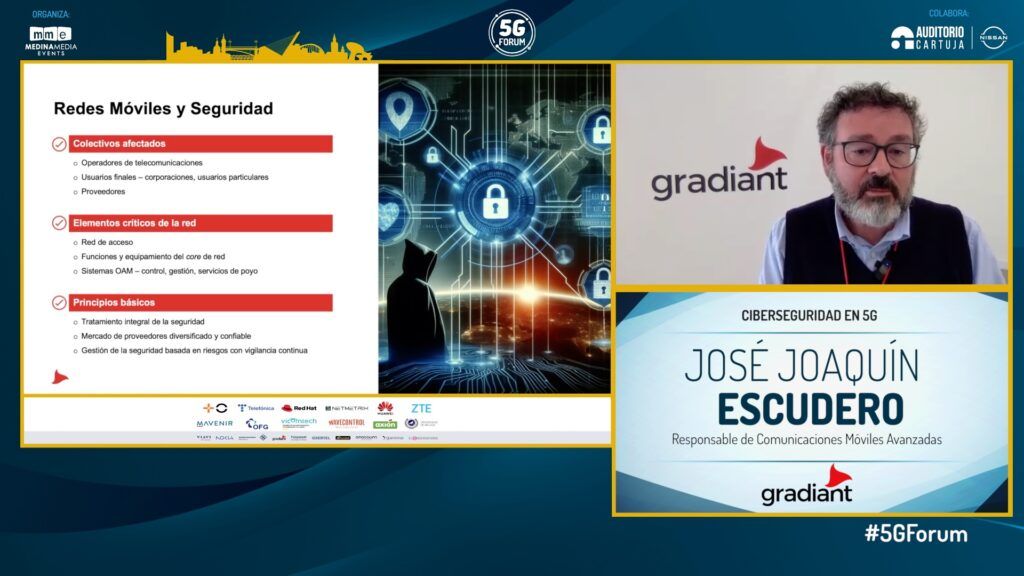
“The strength of a system is the weakest link in the chain. The stronger the weakest link, the more secure your network will be,” said José Joaquín Escudero, who insisted that “5G significantly increases security with respect to 4G” and pointed out that research and innovation R&D+i will be fundamental for improving security in future mobile networks.
“Only 20% of planet Earth has mobile coverage.”
Germán Martín, Applications Engineer at Rohde & Schwarz, was in charge of presenting a topic that has generated a lot of interest at the 5G Forum 24: non-terrestrial networks (NTN). “In recent years, there has been growing interest in integrating satellite communication in mobile devices,” said Germán Martín, who pointed out that “80% of the world’s population has coverage, but only 20% of the planet Earth (including the oceans) has mobile coverage“.
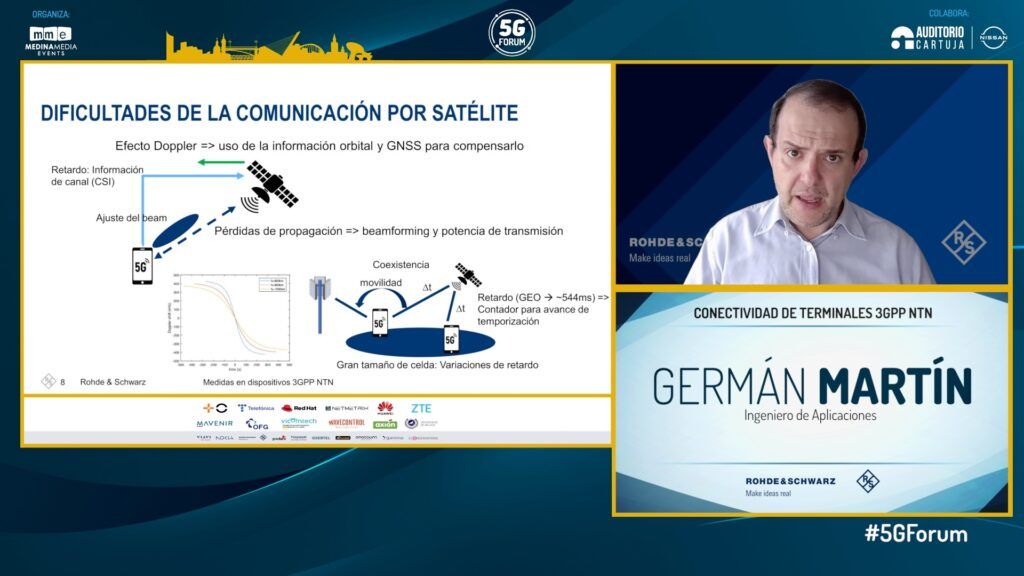
In this context, non-terrestrial networks are emerging as a “solution for new use cases such as ships, airplanes or remote areas, which will benefit enormously” from this technology. It can also be used in emergency or rescue situations, which will facilitate communications in critical environments.
Advanced 5G has already been tested in China with the first smart subway or 8K streaming
Víctor Pascual, CTO in Spain and Portugal at ZTE, drew a sketch of what will be the 5G Advanced, a step beyond the 5G network and a prelude to the 6G with which “we move from a triangle of three pillars to a hexagon with more services such as 10Gbps per second, AI or Universal Intelligence, deterministic capabilities to have control, ubiquitous connectivity, the Internet of Things (IoT) and the integration of the sensory part with the communicative part”.
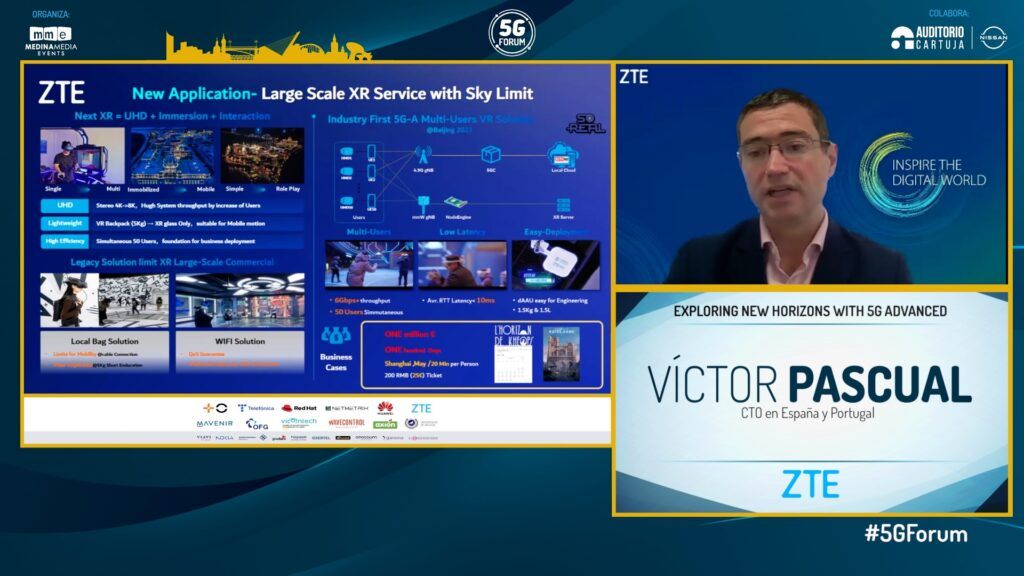
Advanced 5G is a technology that ZTE has pioneered and has already been tested in China with the first smart subway with 5G technology or 8K streaming broadcasting without any wiring thanks to the introduction of millimeter or intelligent and configurable surface solutions that improve coverage and lower latencies.
The possibility of using 5G with very high quality video and audio encodings.
Santiago Otero, head of 5G development at Gsertel, addressed the concept of 5G Broadcast, its evolution over recent years and its adaptation of use to new needs. As a company dedicated to the sale of measurement and monitoring equipment to more than 90 countries, Gsertel contributed to UHD Spain’s pilot test of a concert broadcast in 5G Broadcast with different equipment, including its innovative HEXYLON portable analyzer. “A rewarding experience” for Santiago Otero, as it demonstrated the “possibility of using 5G with very high quality video and audio encodings”.
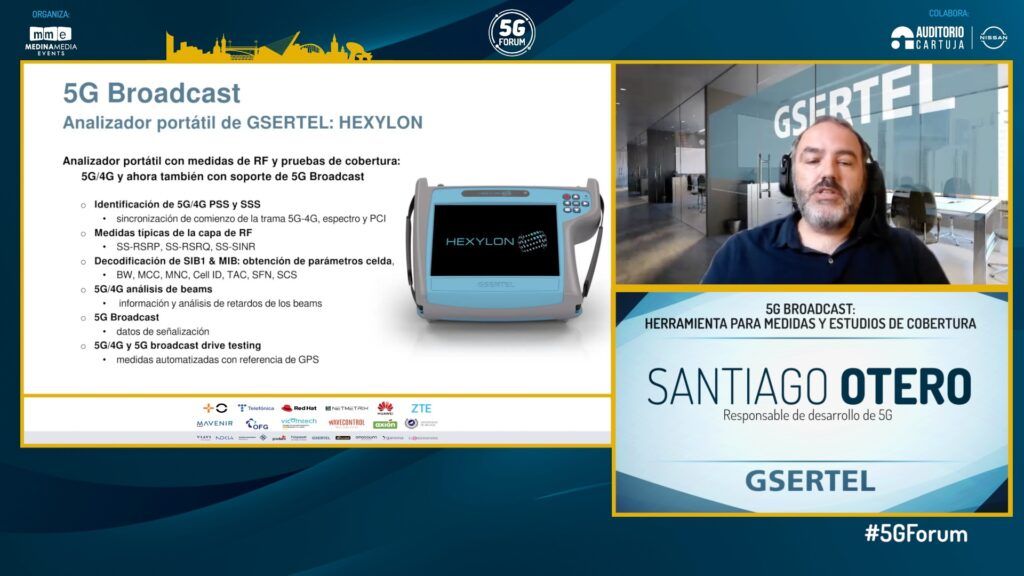
High impact
The 5G Forum has established itself as a reference forum in the technology sector, as it is a unique showcase with a multidisciplinary vocation to publicize every year the use cases and success stories of operators, companies, universities and institutions. International, national, regional and local media have reported on this seventh edition: Canal Sur, Europa Press, Agencia EFE, ABC, Diario de Sevilla, La Razón, La Vanguardia, Cadena SER, Radio Intereconomía, El Correo, etc.
Today, Thursday, May 9, the fourth day, the second virtual day, of the 5G Forum 24 will be held, which will address relevant topics such as the R&D roadmap for the future 6G to be a more sustainable network and service, the situation of 5G in Europe or 5G as a fundamental tool for the audiovisual sector.
All the presentations of this and previous editions can be viewed through ‘The Observatory’, the digital platform of Medina Media Events, where all the interventions will be available 24/365 for on-demand consumption, like Netflix, but free of charge.
The seventh edition of the 5G Forum is organized by Medina Media Events and is supported by MASORANGE, Telefónica, Red Hat, Netmetrix, Huawei, ZTE, Mavenir, OFG, Vicomtech, Wavecontrol, Axión, the University of Málaga, Viavi Solutions, Nokia, Rohde & Schwarz, Gradiant, Hispasat, Gsertel, AI Funded, Opossum and Gamma Solutions, among others.